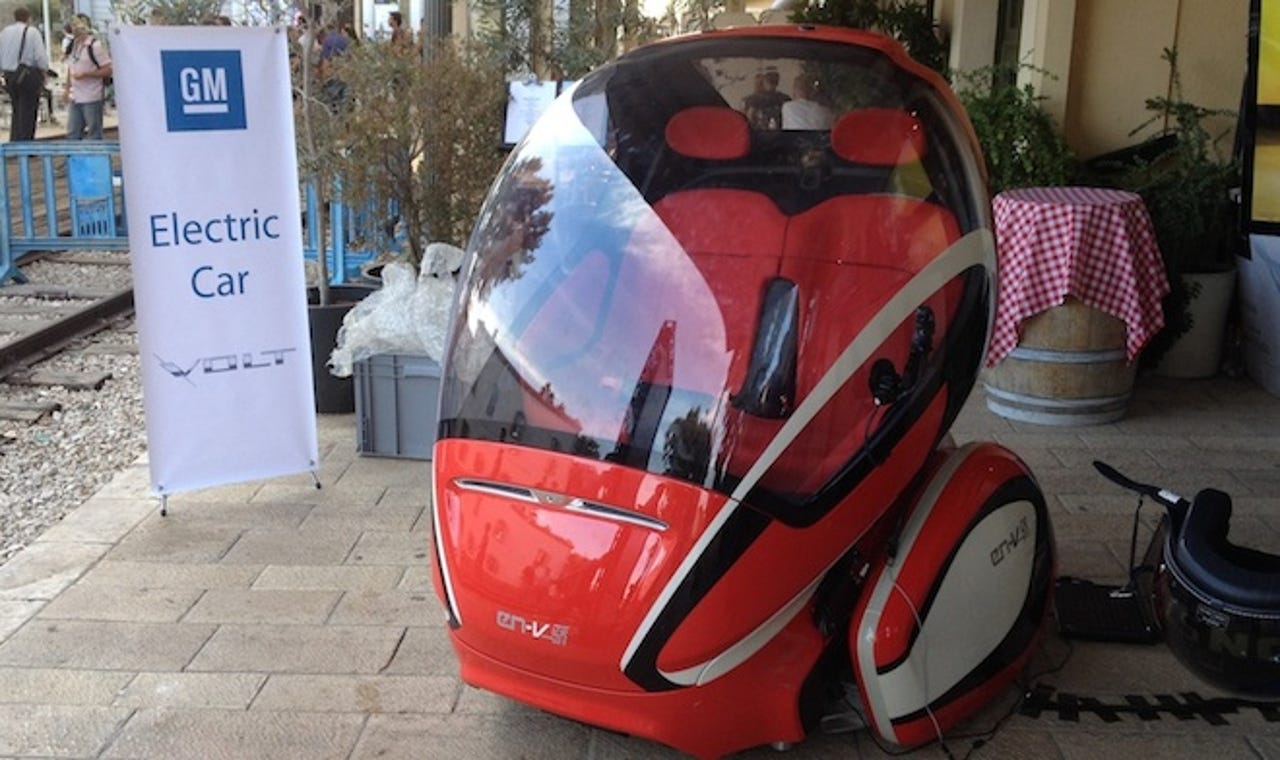Big data, 4G, and life-saving sensors: GM's vision of the smart car future


The car of the future is going to drive itself, brake itself, park itself (more or less) — and be part of a worldwide communications system that will be based on 4G; it will gather and communicate data, that will be used to offer a Facebook-style personalised experience to drivers.
That's the vision of the future smart car that General Motors presented at an event in Israel recently, as Gil Golan, director of GM's Advanced Technical Center (ATC) in Israel, shared the company's view of how the vehicles of the future could look.
"Connectivity in vehicles is key to so many things, and it is one of the major trends that is remaking the industry," Golan told the DLD conference. "What we envision is a vehicle that is connected to servers that help drivers get where they have to go, and can communicate with other vehicles, and even with drivers when they are not in the vehicle."
GM's research, Golan said, says that customers want connected vehicles: "They want their vehicles to be like a smartphone, and have the same always-connected experience." GM is aggressively pursuing the smart car market, just as other car companies — along with Google and Nokia — are doing.
GM, which emerged from bankruptcy in 2009, has been profitable since its huge IPO in 2011. As a result of the bankruptcy, the company was reorganised into two units — General Motors Company, and Motors Liquidation Company, which is tasked with settling the old GM's debts.
The new GM sold off various assets as part of its bankruptcy deal, but it retained the Israel ATC, which has been operating since 1995. "We had some limited projects until 2007, but since then we have been involved in numerous important projects for GM," Golan said of the Israel facility.
During a presentation called 'Drive the Future' at the DLD (Digital Life Design) festival in Tel Aviv, Golan laid out the company's vision for self-driving, hyper-connected smart cars, which will be loaded with sensors and communication equipment to give drivers the always-connected experience GM believes they want. The first vehicles with smart features will be introduced over the next few model years, Golan said.
GM's future vision
A typical driving scenario would have a self-driving car stop automatically at a red traffic light, or stay within the speed limit. Video cameras would alert a driver if they are too close to the vehicle in front of them, while cameras and sensors could determine the ideal distance between vehicles and take over the work of driving, with the driver taking over in order to make a turn, exit an expressway, etc.
Apps could let drivers communicate with others on the road, and get information about traffic conditions, nearby services and places of interest, and more. Vehicles will even be able to direct drivers to parallel park more successfully, using sensors that indicate which direction to turn the wheel, how far to turn it, when to reverse, and so on.
Much of the work that makes GM's smart car smart is being done at the Israel ATC, Golan said. "Almost all the smart sensing, vision image sensing, human machine interface, digital user experience, and wi-fi/4G work is being done in Israel." There are more than a hundred systems in a car that are being rewired for off-board processing. "Essentially we are turning our vehicles into 'car clouds', moving the processing out of the vehicle and into the cloud where possible."
The key to doing this will be the development of a 4G LTE network for GM cars, Golan said. "With 4G we will be able to crunch the data that sensors for each system upload and send it back to the vehicle with almost no latency."
GM, he said, is working on building a 4G network (on its own, and in conjunction with partners) around the world, and in the next few years the company will be rolling out its network in the US, China, Europe, South America, and elsewhere. Systems in the car will store data to allow for a smooth feeling of connectivity for periods when the vehicle is out of range in the network.
"We sell in 140 countries around the world and we plan on implementing this everywhere we sell," Golan said. "Obviously it will not happen overnight, and we are not taking a 'one size fits all' approach. We will have models with different levels of online capability depending on the state of the network. But we plan on putting in a very wide pipeline."
The data collected by smart cars won't only be used to guide drivers, Golan said; GM sees value in that data, and intends to leverage it like other data companies do.
"There is a lot of personal data out there known and owned by Google, Facebook, and Amazon," Golan said. "We in GM already know a lot about driving behaviours, and we with smart cars we will have access to even more data. We haven't utilised this yet to offer personalised services to drivers, like the social media companies have, but that is coming," he said.